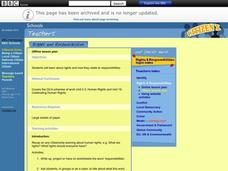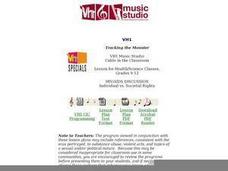Curated OER
7 Steps for Creating a Socially Conscious Community
Twelfth graders examine the steps that one can take to turn awareness of a human rights abuse into action it. In this Current events lesson, 12th graders analyze the compelling factors which can influence personal action in any given...
Curated OER
We Can Change the World!
Students use newspapers and websites to examine human rights' abuses issues. They consider how these rights' abuses relate to citizens' rights. Following their research, they write a journal entry and discuss an action or project they...
BBC
Rights and Responsibilities
Middle and high schoolers engage in a lesson about rights and responsibilities, and the differences between them. After a class discussion, pupils break off into pairs and come up with mimes that respect or abuse a specific right such...
Curated OER
Anne Frank: Interviews
Students conduct an interview with a person who was alive during WWII. They explore the media coverage of human rights abuses and speculate about what American knew and when regarding the Holocaust. They prepare a commentary with their...
Curated OER
Protecting the Planet
Students discuss being a responsible student by helping to protect the rainforest. In this citizenship lesson, students brainstorm ideas to help global warming, warfare, human-rights abuses and acid rain. Students write an essay to send...
Curated OER
Amnesty International
Students are introduced to the phrase 'human rights. They discuss how they would feel if they were an underage soldier. Students are divided into small groups, they work together to answer questions such as: How would you define...
Curated OER
Guantanamo Bay
Students are divided into small groups, they work through questions in their groups. They read the story UK terror suspects to come home. Students are then introduced to the phrases' 'human rights' and Geneva Convention and students...
Curated OER
How Can You Be a Revolutionary?
Tenth graders identify priorities in human rights for children. They discuss the role the United Nations has in bringing nations together to work for peace and development. They create a list of imperatives that would address oversights...
Baylor College
Pre-Assessment: The Brain
Break your class in to the general structure and function of the brain. Brainiacs discuss what they know about it and create personalized brain development timelines. They also take a true-false, pre-assessment quiz to get them thinking...
Curated OER
Lesson Plan on Homeless Children
Students research reasons as to why children end up living on the streets. This activity examines reasons as to what happens to parents and adult caregivers so that they are no longer able to provide basic needs for these children. ...
Curated OER
Who Made Breakfast
Learners examine animal rights by researching factory farm methods. In this animal abuse instructional activity, students identify how many ingredients used in their breakfast come from animals. Learners research the health hazards...
Facing History and Ourselves
Emmett Till: Connecting the History of Lynching to The Murder
Though the murder of Emmett Till shocked 1950's America into turning attention to the racial crimes of the South, it was far from the first time racism had erupted into violence. High schoolers examine the killing in context with the...
Baylor College
Neurotransmitters Contain Chemicals
Human body systems students play a card game, "Locks & Keys" in order to learn that neurotransmitters carry a message from one neuron to another by fitting into a receptor site on the receiving nerve cell. While this activity can...
Curated OER
Prisoners of war
Students explore the theory of Prisoners of war. Students investigate various human rights issued thru the Geneva Convention. Students relate learned facts to the American troops being killed in Iraqi fighting.
Curated OER
Discussion Guide: Grades 9-12
Students discover that wars and human rights abuses are going on around the world every day. They discuss how the media decide what should be covered and what should not?
Curated OER
Segregation
Students consider the implications of prejudice. In this segregation lesson, students experience a simulation that has school staff favoring students with blue eyes. Students discuss the simulation experience, watch "The Eye of the...
Curated OER
HIV/AIDS Discussion: Individual vs. Societal Rights
Students explore and discuss the issues of personal freedoms and safety as they apply to HIV/AIDS. They consider whether doctors, co-workers, teammates, etc. have the right to know someone else's disease status.
Curated OER
The True Confessions of Charlotte Doyle: KWHL
After completing the 11th chapter of The True Confessions of Charlotte Doyle by Avi, take part in a KWHL chart driven by the question,When is it appropriate and admirable to defy authority? Focusing on codes of conduct, scholars...
Baylor College
What Is a Neuron?
Your class won't get on your nerves while doing this modeling activity! After teaching the structure and function of a neuron using the included diagrams, give individuals some clay and chenille stems so that they can make their own...
Baylor College
Neural Network Signals
Using a simple circuit with the battery representing the brain, future physiologists test to see which solutions conduct electrical "nerve impulses." Enlighten learners with plentiful information on electric signals in the nervous system...
Baylor College
Food for the Brain
With a couple of neat diagrams on student handouts, your life science or health class will examine the contents and serving sizes of healthy foods. They dissect a slice of pizza and scrutinize the nutritional value of its components in...
Baylor College
Post-Assessment: Brain Chemistry
If you have implemented this fabulous brain chemistry unit in its entirety, you should have saved the pre-assessment quizzes from day one. In this assignment, individual learners go back over their original answers, and correct any...
Curated OER
In His Own Words: James Madison On the Problem of Faction
Students are introduced to the writings of James Madison and explain why he is often called "The Father of the Constitution". Using primary source documents, they examine his view of the Bill of Rights and what he meant by faction. In...
Curated OER
A Toolbox for Preventing Genocide
High schoolers explore the implications of genocide. In this genocide lesson, students reflect on the response of America to genocide in Armenia, Rwanda, and Darfur. High schoolers consider how to prevent the loss of human life through...

























